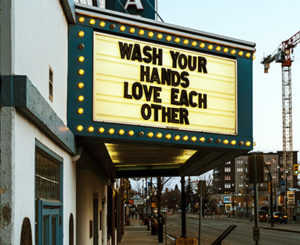Roundup of Links and Fact Sheets on CARES Act and Paycheck Protection Program

Photo credit: Joshua Reddekopp/Unsplash
The United Church of Christ, the U.S. Department of Health and Human Services, and the Network of Jewish Community Service Agencies are among the many groups who today (April 1) released information and helpful web links to materials related to the recently-passed CARES Act and the Paycheck Protection Program.
From the UCC
Heather Kimmel, the UCC’s general counsel, today (April 1) sent information about the Paycheck Protection Program (PPP) to all covenanted UCC partners.
“If you have churches interested in applying for this loan, they need to apply NOW, as the available funds are expected to be exhausted quickly,” says Kimmel. The links below include a fact sheet and the application form, which should be submitted directly to a lender identified as a participating lender on the SBA website, rather than seeking the application from the lender.
Other useful information from the UCC
The following resources may be helpful to those interested in loans and unemployment under the CARES Act. The Baptist Press article particularly addresses unemployment for ministers and asserts that ministers will be able to apply for unemployment relief from the state—each state will administer unemployment using the federal funds, so much remains to be determined with the unemployment provisions.
Economic Injury Disaster Loans and Emergency Economic Injury Grants
CHHSM also has a list of COVID-19 resources that is continually being updated.
From the Network of Jewish Community Service Agencies
The Coronavirus Aid Relief and Economic Security (CARES) Act includes more than $2 trillion to help individuals and businesses struggling amid the COVID-19 pandemic – with $350 billion in new Paycheck Protection Program loans available to non-profit organizations, like yours, with fewer than 500 employees.
The Jewish Federations of America worked with national non-profit partners to advocate for these provisions and now we are providing resources to non-profit organizations across the country to help them apply for these loans which will pay for payroll, rent, and other expenses.
JFNA is hosting a webinar on this process this week on Friday April 3 at 12 noon ET, hosted by Charlotte Haberaekcer from Lutheran Services of America. Please join us for this important webinar and extend the invitation with registration link below to your members. To sign up please register here.
Information from the U.S. Department of Health and Human Services
Here is the latest revised edition of the Partnership Center’s Recommended Preventative Practices and FAQs for Faith-based and Community Leaders with updated guidance and recommendations. In the meantime, we wanted to share time sensitive information regarding current economic relief opportunities. Note the webinar offering below.
Congressional Action
In response to the COVID-19 crisis, Congress has passed three bills aimed at providing economic relief:
H.R. 6074: Coronavirus Preparedness and Response Supplemental Appropriations Act, 2020 — Enacted March 4, 2020. Provided $8.3 billion in emergency funding for federal agencies to respond to the coronavirus outbreak related to developing a vaccine, medical supplies, grants for public health agencies, small business loans, and assistance for health systems in other countries. Allowed for temporarily waiving Medicare restrictions and requirements regarding telehealth services.
H.R. 6201: Families First Coronavirus Response Act — Enacted March 18, 2020. Guaranteed free coronavirus testing, established paid leave, enhanced unemployment insurance, expanded food security initiatives, and increased federal Medicaid funding.
H.R.748: (CARES) Coronavirus Aid, Relief, and Economic Security Act – Enacted March 27, 2020. Includes direct payments to Americans, an aggressive expansion of unemployment insurance, billions of dollars in aid to large and small businesses, and a new wave of significant funding for the health care industry.
Resources and Applications
Coronavirus Emergency Loans Guide and Checklist for Small Businesses and Nonprofits
The U.S. Chamber of Commerce Foundation’s Coronavirus Emergency Loans Guide and Checklist for Small Businesses and Nonprofits — Starting April 3, small businesses and sole proprietorships can apply for loans through existing SBA lenders. Starting April 10, independent contractors and self-employed individuals can apply for loans through existing SBA lenders. Other regulated lenders will be available to make these loans as soon as they are approved and enrolled in the program.
Visit www.sba.gov for a list of SBA lenders. There is a funding cap, so the Treasury Department recommends applying as soon as possible.
Paycheck Protection Program/CARES Act
The Treasury Department released details about how small businesses can apply for the Paycheck Protection Program — which provides $349 billion in forgivable loans to businesses employing fewer than 500 people. The program — which is part of the CARES Act that was passed and signed into law last week—will help America’s small business entrepreneurs face the challenging economic conditions sparked by the coronavirus outbreak.
As noted above, small businesses—including sole proprietors—can begin applying for the financial relief on April 3, 2020. Independent contractors and self-employed individuals can begin applying on April 10, 2020. The program will be open until June 30, 2020, but small businesses are encouraged to take advantage of the financial relief as soon as possible.
Other resources that may be helpful
Independent Sector’s CARES Act: How to Apply for Nonprofit Relief Funds
Join their webinar April 2, 2020. 2:00 – 3:00 p.m. Register here.
Working in partnership with Washington Counsel Ernst & Young, Independent Sector has provided a resource to help nonprofits navigate this very dynamic landscape. Many details and protocols that will govern the flow of these resources are still being developed and shared, so information is evolving daily. Join their Thurs. April 2 at 2:00-3:00 pm as they provide an overview and discuss additional federal policy needs and the prospect for addressing them in future legislation.
Also Learn more about the CARES Act and how nonprofits can apply for assistance.
Funding opportunity
Stand Together.org’s funding for fresh ideas to combat COVID-19.
Join Our Mailing LIst
"*" indicates required fields
